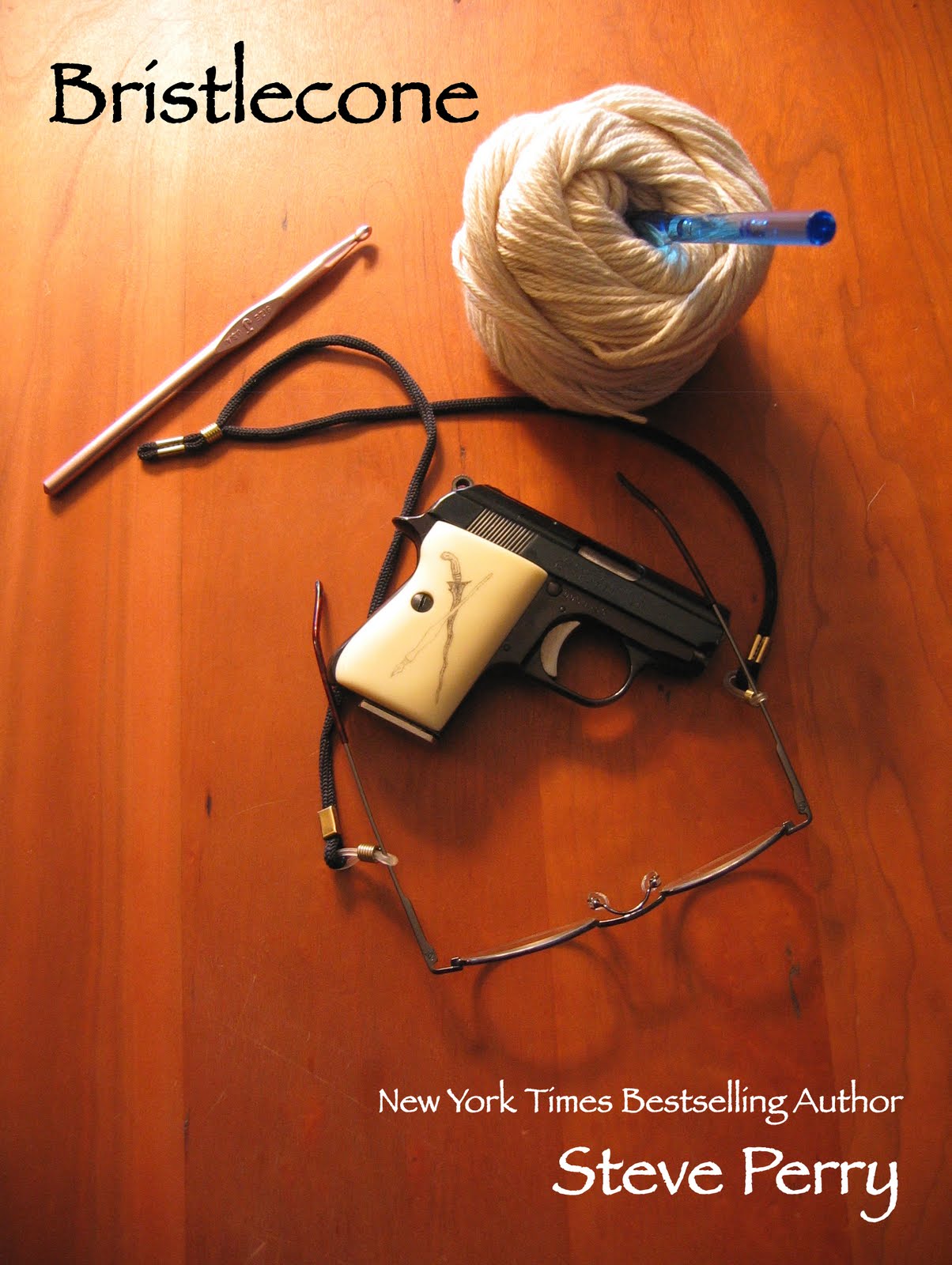
Over on Rory's blog (Chiron), the subject of expectations in a fight came up, and Rory made some excellent points. I asked a follow-up question, and it's only fair that I offer my thoughts on how to address things from the silat perspective. Rather than clog his blog, I'll do it here.
Silat, as we practice it, is a positional art. Being in the right place at the right time is better, we believe, than having a hard punch and a killer sidekick.
Range varies, and there are all manner of ways to divvy them up. In unarmed combat, these tend to be broken down into four distances -- kicking, punching, elbow, and grappling, from longest to shortest. In armed single combat, there are many more: rifle, pistol, shotgun, spear, sword, knife ...
For us, what is paramount are the same three things most valuable in a small business: Location, location, and --
-- yep, location ...
What this essentially means is that we believe the person who controls the position, (of which distance and timing are an integral part), that person has the advantage. (There is a good study of how people come up with various maps of distance, and what constitutes personal space in the recent pop neurological book, The Body Has a Mind of Its Own, which is worth a read.)
Having the advantage doesn't make you bulletproof, you could still get your ass kicked, but better to have it than not.
So, how do we approach this? Well, a big part involves being proactive instead of reactive.
What the attacker wants to do isn't nearly as important to me as what I want to -- and can -- do.
Somebody jumps out of the bushes behinds you and whacks you on the head with a cricket bat, you're screwed. Total surprise is a big advantage -- more often than not, the first solid hit to connect decides the fight. If you don't see danger coming, it is apt to get you. Baddest fighter who ever lived doesn't shrug off a .308 to the brain.
So part of the strategy involves paying attention. Don't turn your radar off when you are out and about.
Once you have lift-off, once it is obvious somebody is meaning to do you harm, you don't have to wait on him. It isn't necessary for him to throw the first punch. (Or, if he has a gun, fire the first shot. That's only in Roy Rogers and the Lone Ranger's worlds.)
Waiting puts you behind the power curve. Reaction is simply not as good as action.
If the bad guy punches and you block, then he punches again, and you block, and he throws another and you block that one, sooner or later you lose. If you block ninety-nine and he launches a hundred, you eat one. No solace in getting a 99% in that situation.
If you block, then counter, and he blocks and counters, then the match goes on until somebody flubs. One-two, one-two, one-two, one-oops ...
Bad idea. Don't go there. It's a mug's game.
So, part of what we try is to change both the timing and our thinking. Blocking is a last resort; better to think hit, using the same motion. Cut the line, block the attack as you generate your own attack. Catch up -- and forge ahead. It's not about pure speed, it is about timing. In muscial terms, you want to be playing a triplet to his single note, or sixteenth-notes to his quarters.
Whatever an attacker's game is, better you don't play it -- play your own, and make him do it your way, if you can.
Of course, how do this isn't necessarily easy, but it is pretty simple. If, for every attack he throws, you offer him three, you take away his initiative and force him to react to you. If, as he is roaring in to smack you, you get to a position of balance first, better for you.
No, you can't go into a dust-up thinking, "Okay, he's gonna throw a right and a left, so I'll block this way, then that, and then step in and give him an elbow for lunch." Pre-planned specifics aren't going to work unless the bad guy follows your script, and chances are, he won't. But stealing his time and upsetting his position and making him react to what you are doing isn't a bad general idea. Exactly how to do it, you won't know until you get there.
This is why we drill our tools, so that when the opening comes, we'll have something to put forth.
And yeah, shit happens, and you are going to have to deal with things not going according to plan, but the more you depend on basic principles and not specifics, the more wiggle room you have.















4 comments:
This may be another one that goes better over coffee, Steve, but I think I've identified one of the bigger differences in our approach. You mentioned at lunch that Silat was primarily a dueling art. Here are some quotes from the entry:
"What this essentially means is that we believe the person who controls the position..."
"Well, a big part involves being proactive instead of reactive."
"...once it is obvious somebody is meaning to do you harm, ..."
Click, click (the sound of me thinking) this works from the assumption that control of position is up for grabs; that proactive and reactive are choices; and that you will have a clue of the threat's existence and intention.
These are all good things and, to be clear before anybody gets excited, I'm not arguing your way versus my way. That bridge I was looking for?- this is a big piece.
Sosuishitsu (and my training and experience) deal with the problem not of gaining the advantage, but of recovering from catastrophic failure:
"Somebody jumps out of the bushes behinds you and whacks you on the head with a cricket bat, you're screwed."
Maybe screwed, maybe not, but this is exactly the type of situations (and having your sword or spear broken or dropped in the midst of a medieval battlefield) that the ryu was centered around. The only place for unarmed technique was an assassination attempt so unexpected that you couldn't draw a weapon or the unexpected loss of a weapon.
When I write or think about fighting, I think almost exclusively of ambush recovery. If I see it coming, I'm confident that I can avoid it or change the conditions. What's needed- in speed, simplicity, ferocity, mindset- for an ambush is different than what you can call on for an expected fight.
When the book comes out you are going to love the section on the tactical matrix.
Rory
I'm pretty comfortable on this ground, and my thinking goes something like what they say about the differences between iaijutsu and kenjutsu -- when the sword comes out of the sheath for the first move, it's iai -- after that, it's ken.
All martial arts of real use are dueling arts -- and if you aren't aware of a deadly threat by somebody who knows what he is doing, you're a dead man.
If I'm behind somebody and I put a couple rounds into his head, he isn't going to recover enough to be a threat to me in the near future, certainly not with his hands, because I have four more rounds before I have to reach for the speedloader. Even with a puny handgun, six for sure will give him something else to think about other than punching me in the nose.
If you cannot perceive a threat, you can't do anything about it.
My assumption is that if I have any time to see the bad guy coming, then I will have some choices, and position will be one, as well as altering the timing.
If I don't have any time, I have to depend on the idea that he will screw up and not deliver, and that doesn't strike me as the best bet.
This could be wrong, but it is certainly more reasonable in my mind to train for getting out of the way than shaking off the bat to the head, cricket or baseball.
What we train for is to avoid catastrophic failure in the first place -- the proactive stuff --
so we don't have to recover from it. Yep, we might lose our knife or golok and have to go to empty hands, but that is the last resort
Bare hands are for when your knife breaks; your knife is for when you run out of bullets.
How to recover from a faulty ambush would be something very useful to know, but an effective ambush, total surprise?
It was me with the bat coming up behind somebody and I got a free swing, I wouldn't like their recovery chances even if they were the Terminator.
I don't see how you can train for that, save maybe iron-head stuff, and it seems much better to me to learn ways to avoid being taken by surprise in the first place.
I think this is a big philosophical difference in how we see things.
And for my part, as soon as you recover from the misplaced attack, you are dueling, and then it gets into what you know and how well you can apply it.
I see him, he sees me: duel.
Or am I missing something completely here?
I think so.
"All martial arts of real use are dueling arts."
In Jujutsu you can identify four stages. The older battlefield arts are very different- very simple, brutal, ruthless; based entirely on gross motor skill. During the Tokugawa, battle became rarer, but dueling was still legal. The dueling arts then evolved- more complicated (because it was a test of skill with a peer, instead of a test of will versus advantage) still deadly, but balanced in a way that was suicidal on a battlefield dominated by hand-to-hand weapons. On a battlefield, if you took time to size up and feel out a particular enemy, someone else would kill you. When dueling was outlawed (I believe with the Meiji) The sport arts evolved. About the same time or a little before, the 'arresting arts' arose when it was no longer politic to simply kill anyone for a crime or insult.
Each stage in the evolution lost something and increased something. Of the modern systems, it's easy to see that the ones that didn't keep their dueling roots lost a huge amount in technique, in mindset and in strategy.
But the dueling arts lost a lot too.
"This could be wrong, but it is certainly more reasonable... getting out of the way than shaking off the bat to the head..."
(deliberately misquoted to make a point) It is always better not to be there, so it is not wrong except in the implication that you have a choice I'd much rather be missed, but if not, that doesn't mean it's over unless I've convinced myself to give up.
The real quote: "This could be wrong, but it is certainly more reasonable in my mind to train for getting out of the way than shaking off the bat to the head..."
On this one, Steve, I'm bringing the baggage to the table. Years ago I was describing real assaults to a 'Self-defense instructor'- some home invasions, close range ambushes, stuff like that. His response was "You can't do anything about that kind of stuff so we don't train for it." Despite the fact that everything- close range stabbing, yes baseball bat (or in my case crowbar) to the back of the head, waking up with someone pinning you under your sheets had all been survived. This idiot had decided to train for the stuff that was easiest to train for. Not what happened, not what his students needed. The easy stuff. Despicable. (oops, better add IMO)
"If you cannot perceive a threat, you can't do anything about it."
There's always soft body armor. Flippancy aside, this is absolutely true, but sometimes your first perception of the threat is impact, and then you can and must do something- even if the impact left you with an arm you can't use, dizzy, blind or ...
"My assumption is that if I have any time to see the bad guy coming, then I will have some choices, and position will be one, as well as altering the timing."
One of the most important things is to have strategies for failures of your primary assumptions. What have you been trained to do if you didn't see him coming? How do you recover in a fight from injury? How are you taught about surprise? A blitz attack flurry... and then the big question, how do you deal with all three at once because that is the basic predatory assault.
In can be trained for. It can be overcome (sometimes). I think it is a potentially deadly disservice to ignore the basic elements.
But it also brings up the most basic fears- you can't be safe. Only safer. Yes, I've been pinned up against a wall and fought off two people. Not three. Not four. No weapons. Change a factor and maybe I died, maybe not. Sudden backstab with a knife? Survived without a scratch, but I'd be a fool to call it anything but luck and I wouldn't be in that position again with any choice- but I didn't have a choice that time and I won't next time. Sorry, tangent, because those sound like successes and when shit hits at this level- ambush survival- you become very aware that no matter how alert you are, how fit, how trained, how armed, how armored there are levels of violence that can crush you like a bug on a windshield.
Once you look at the dynamics of assault you can try to deal with it or choose not to.
I need some coffee.
"... when shit hits at this level- ambush survival- you become very aware that no matter how alert you are, how fit, how trained, how armed, how armored there are levels of violence that can crush you like a bug on a windshield."
Agreed. If the Chinese army comes over the hill, I don't expect I can beat 'em, no matter how much I've trained.
So there is no point in training for that.
If Shiva, Destroyer of Worlds, steps out of the alley, I'm going to have a problem.
For me, the work needs to start by dealing with the *most likely* things I am apt to face, and can *do* something about.
I doubt I'm going to spend much time on a battlefield where I have to deal with sword-bearing enemies after I drop my spear or my own sword gets broken.
I got swords, but I don't expect I will get much of a chance to use one. And while it is possible I might get jumped by ninja walking to the Safeway, I won't have my long blade with me anyhow.
They frown on that in Beaverton, walking around with a sword.
I have a machete, and if I am out taking the blackberries dolwn out back and somebody hops the fence and comes at me, I can use my bush blade, but I won't have that with me when I'm going to a concert at the Schnitz.
It's fun to play with that length blade, but it won't be the place where I spend most of my training.
That .308 to the temple isn't likely in my case, and as you said, I couldn't do anything about it if it happened.
Being hit by a meteorite, same deal. (You can buy insurance for that, you know. I don't have that policy, no intentions of getting it ...)
Since you can't deal with everything, you have to decide what you can deal with, and what you might have to deal with, and start there. At least, I do.
I've practiced sparring with one hand -- sometimes no hands -- and shooting with my weak hand. I know how to rack the slide on a semi-auto pistol with one hand, but since I don't carry such a piece, I haven't spent a lot of time doing it.
I could, conceivably, get into a gunfight, get shot in the right arm, lose my revolver, pick up a pistol, and have to rack the slide and then shoot with only a working left hand. I wouldn't bet any money that's ever gonna happen, and I wouldn't spend a lot of time practicing for it.
I was a street cop? Yeah. Sixty-year-old writer? No.
At one point, I spent the day blindfolded in my house, to see how it felt and how I could function.
These are interesting games, but not those upon which I will spend significant amounts of time.
If I tried to think up every possible dangerous situation that might arise -- and having a pretty good imagination -- it would become a full-time job. That way lies total inertia -- how could I drive if I had to consider that every car in the other lane might veer into my path and hit me head-on, and what would I do in each case, at all possible locations?
Yeah, I drive defensively, but there is an assumption I have to make when I get behind the wheel, or I wouldn't start the engine: Everybody on the road is not out to kill me.
Training time is finite, and since, as we both know, you can't train for everything, I believe you have to decide how best to spend that time.
Focusing on the *likely* is not the same as training for the easy stuff only, in my mind. There comes a point of diminishing returns.
I guess what I'm saying is that much of what you do and have done is in a category far different than most of what I do. You have special needs. My chances of being attacked in a holding cell by a killer a couple times a week are pretty slim.
Your streets are meaner than mine. While it is possible I might run into unexpected problems anywhere, the odds are different. Given your baggage, I can understand why you train as you do.
Given my baggage, it's not the best use of my time to train that way.
Post a Comment